International Journal of Scientific & Engineering Research, Volume 4, Issue 6, June-2013 1199
ISSN 2229-5518
Distribution Transformer Monitoring Using GPRS
Dr.J.Jayakumar, J.Hephzibah Jose Queen, Thanu James, G.Hemalatha, Neethu Lonappan
Abstract— This paper presents a system which works on a wireless, real time, multi-object monitoring system of Distribution Transformer depending on GPRS network. A design based on PIC Microcontroller is developed for monitoring the key parameters of Distribution Transformer in a substation. An algorithm for monitoring the voltage, current and temperature is developed and programmed to the microcontroller. It is observed that the proposed system is effective in monitoring and displaying the data using wireless communication network.
Index Terms— centralized monitoring, W iriless Transmission system, Distibution Transformer, Temperature Sensing and Microcontroller
—————————— ——————————
1 INTRODUCTION
istribution Transformer is critical equipment in power system.The reliable operation of the power system depend upon the effective functioning of the distribu-
tion transformer. Therefore monitoring of key parameters like voltage, current and temperature are necessary for evaluating the performance of the distribution transformer and also helpful to avoid or reduce disruption due to sud- den unexpected failure. [9]

former and microcontroller is programmed in such a way when the monitored values exceed the rated values it dis- plays the value in different color so that it attracts the atten- tion of the monitoring person. The microcontroller is pro- grammed in such a manner so as to continuously scan the transformer and update the parameters at a particular time interval.
The present method for monitoring of distribution transformer has the following drawbacks
a) Operation in case of equipment failure are done manual b) Time consuming
c) Demand a lot of labour work
d) Production process also gets affectd at the outmost.
The reliable operation of distribution networks can
be improved by implementing centralized monitoring [11].
Centralized monitoring realizes the overwhelming ad-
vantage of wireless communticating technology such as
convenient, fast and low transmission cost. Therefore it’s
feasible to implement GPRS to achieve wireless data tran-
simission.In this paper we discuss about monitoring of Dis-
tribution transformer parameter using GPRS. The system is
capable of communicating in both direction i.e. it can acts
as both receiver and transmitter. The parameters that will
be monitor include [12]
i) Voltage
ii) Current
iii) Temperature
This paper comprises of the following sections:
Section 2 deals with block diagram. In section 3, the system
Distri- bution trans- former
11Kv/
433V
(3+1) Current transfomer (CT1231)
(3+1) Potential transfomer (230/12V)
Tempera- ture sensor LM 35
I-V Converter
Voltage divider
5V
power
Supply
Micro- control- ler PIC
16F87A
Max
232
Server
GPRS moden SIM 300
components are presented.Section 4 presents the interfac- ing various components with PIC micro controller.Section 5 comprises of the system, results and discussions. Section 6 discuss about the conclusion.
2 BLOCK DIAGRAM
The proposed system is based on microcontroller (PIC) that monitors the voltage, current and oil tempera- ture of a distribution transformer.The monitored output will be display on a PC through wireless communication network.The monitored output will be display on a PC through wireless communication network. The monitored outputs are compared with the rated values of the trans-
Fig 1 Block diagram of the proposed monitoring system
Since the input voltage to the microcontroller is 5V the voltage and current from the transformer are step down and rectified by voltage transformer (230/12V) and current Transformers (CT1231) the temperature of the atmosphere and the oil are sensed by the temperature sensors (LM35). These values are given as inputs to the micro controller through the ADC channels and are stored. These data are sent to the website through the GPRS modem. The data sent by the GPRS modem is stored in the database and up- dated to the website as Normal, Critical and over limit val- ues
IJSER © 2013 http://www.ijser.org
International Journal of Scientific & Engineering Research, Volume 4, Issue 6, June-2013 1200
ISSN 2229-5518
3 COMPONENTS SPECIFICATIONS
The components used for monitoring of distribu- tion transformer are listed in the table 1.
TABLE 1
Components Specification
Sl. No | Components | Specification | Quan- tity |
1 | Microcontroller | PIC 16F877A | 1 |
2 | Potential Transformer | 1ϕ, 230/12V | 3 |
3 | Current Trans- former | 1ϕ, 0.25 -20 A | 3 |
4 | Temperature Sensor | LM 35 (-55° to 150°) | 2 |
5 | GPRS MODEM | SIM 300 Data Speed:100kbps | 1 |
3.1 PIC Microcontroller

PIC16F877A is a small piece of semiconductor in- tegrated circuits. The package type is of the integrated cir- cuits is DIP package. DIP stands for Dual Inline Package forsemiconductor IC. This Package is very easy to be sol- dered onto the strip board. However using a DIP socket is much easier so that this chip can be plugged and removed from the development board. PIC16F877A IC can be repro- grammed and erased up to 10,000 times. Therefore it is very good for new product development phase. It is very popular because PIC 16F877A is very cheap. Apart from that it is also very easy to be assembled. Additional com- ponents necessary to make the IC work are just a 5V power supply adapter, Crystal oscillator and 2units of 22pF capac- itors.
Fig 2 PIC16F877A Some of the features are listed below
(i) All single-cycle instructions except for program branch- es, which are two-cycle
(ii) Operating Speed: DC-20 MHZ clock input DC- 200 ns instruction cycle
(iii) Up to 8K x 14 words of Flash Program Memory, Up to
368 x 8 bytes of Data Memory (RAM), Up to 256 x 8 bytes of EEPROM Data Memory
(iv) Pin out compatible to other 28-pin or 40/44-pin has
PIC16CXXX and PIC16FXXXMicrocontrollers.
3.2 Potential Transformer
Instrument transformers are used for measuring voltage in electrical power systems, and for power system protection and control. When a voltage is too large to be conveniently used by an instrument, it can be scaled down to a standardized, low value.
Instrument transformers isolate measurement, protection and control circuitry from the high voltages present on the circuits being measured or controlled.
.
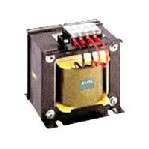
Fig 3 Potential Transformer
Voltage Transformers (VTs), also referred to as "potential transformers" (PTs), are designed to have an ac- curately known transformation ratio in both magnitude and phase, over a range of measuring circuit impedances. A voltage transformer is intended to present a negligible load to the supply being measured.
The low secondary voltage allows protective relay equipment and measuring instruments to be operated at lower voltages. Voltage transformers are designed to have predictable characteristics on overloads.
3.3 Current Transformer
Instrument transformers are used for measuring current in electrical power systems, and for power system protection and control. Where a current is too large to be conveniently used by an instrument, it can be scaled down to a standardized, low value.

Instrument transformers isolate measurement, pro- tection and control circuitry from the high voltages present on the circuits being measured or controlled.
Fig 4 Current Transformer
A current transformer is a transformer designed to provide a current in its secondary coil proportional to the
IJSER © 2013 http://www.ijser.org
International Journal of Scientific & Engineering Research, Volume 4, Issue 6, June-2013 1201
ISSN 2229-5518
current flowing in its primary coil. Current instrument transformers are designed to have predictable characteris- tics on overloads.
3.4 Temperature Sensor
The LM35 series are precision integrated-circuit temperature sensors, whose output voltage is linearly pro- portional to the Celsius (Centigrade) temperature. The LM35 thus has an advantage over linear temperature sen- sors calibrated in Kelvin, as the user is not required to sub- tract a large constant voltage from its output to obtain con- venient Centigrade scaling.
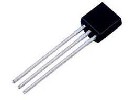
Fig 5 LM35 Temperature sensor
Two temperature sensors are used. One Tempera- ture sensor is to monitor the room temperature and the other temperature sensor is to monitor the oil temperature. LM 35 is directly connected to the analog ports of the PIC Microcontroller (AN6, AN7).
3.4.1 Features of LM35
(i) Calibrated directly in ºCelsius (ii) Linear +10 mv/ºC scale factor (iii) Operates from 4 to 30 V
(iv) Low self heat heating
3.5 GPRS MODEM (SIM 300)
SIM300 is a Tri-band GSM/GPRS engine that works on frequencies EGSM 900 MHz, DCS 1800 MHz and PCS1900 MHz SIM300 provides GPRS multi-slot class 10 capabilities and support the GPRS coding schemes CS-1, CS-2, CS-3 and CS-4.
With a tiny configuration of 40mm x 33mm x 2.85 mm, SIM300 can fit almost all the space requirement in your application, such as Smart phone, PDA phone and other mobile device. PIC cannot be connected directly to modem. So MAX 232 is used to interface PIC and the mo- dem.
3.5.1 MAX 232
The MAX232 is a dual driver/receiver that in- cludes a capacitive voltage generator to supply EIA-232 voltage levels from a single 5-V supply. Each receiver con- verts EIA-232 inputs to 5-V TTL/CMOS levels. These re- ceivers have a typical threshold of 1.3 V and a typical hys- teresis of 0.5 V, and can accept ±30-V inputs. Each driver converts TTL/CMOS input levels into EIA-232 levels
4. INTERFACING THE VARIOUS COMPONENTS WITH
PIC MICROCONTROLLER
4.1 Interfacing Potential Transformer with PIC Micro- controller
The Figure 6 shows the interconnection of the po- tential transformer with PIC16F877A Microcontroller.
The Step down transformer is of rating 230/12
V.The output of the potential transformer is fed into the bridge rectifier for the rectification purpose and the recti- fied output from the bridge rectifier is again fed into the filter circuit inorder to remove the ripples.The DC voltage is stabilized using Voltage stabilizers before it is fed into the PIC Microcontroller.Now the stabilized DC Voltage is fed to the analog ports of the Pic microcontroller.
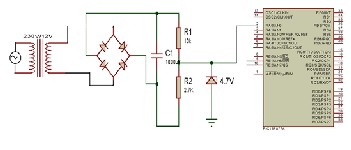
AN0, AN1, AN2 – Analog input for Voltage sens- ing unit to A/D convertor
Fig 6 Interfacing PT with PIC 16F877A
4.2 Interfacing Current Transformer with PIC Microcon- troller
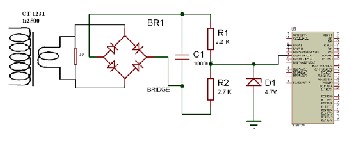
The figure depicts the interconnection between the current transformer and the PIC Microcontroller.
Fig 7 Interfacing CT1231 with PIC 16F877A
In Interfacing of Current transformer with PIC mi- crocontroller the same procedure is followed as mentioned in the interfacing of potential transformer to the PIC Micro- controller except in Current transformer a resistance is connected in parallel inorder to convert the curren to volt- age because the PIC Microcontroller accepts only the volt- age as its input.
AN3, AN4, AN5 – Analog input for Current sens- ing unit to A/D convertor
IJSER © 2013 http://www.ijser.org
International Journal of Scientific & Engineering Research, Volume 4, Issue 6, June-2013 1202
ISSN 2229-5518
4.3 Interfacing Temperature Sensor with PIC Microcon- troller
The figure pictures the interfacing of (LM35) Tem- perature sensor with PIC Microcontroller.
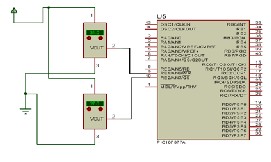
.
Fig 8 Interfacing of LM35 with PIC 16F877A
In distribution Transformer monitoring, two tem- perature sensors are used. One temperature sensor over- sees the atmospheric temperature and the other tempera- ture sensor monitore the oil temperature
AN6, AN7 – Analog input for Temperature Sensor to A/D convertor.
.
5 ALGORITHMS FOR CENTRALISED MONITORING
The step by step procedure for monitoring the dis- tribution transformer key parameters like voltage, current and temperature are explained as follows and also with the help of the flowchart.
STEP 1: Start.
STEP 2: Check the connection.
STEP3: Verify the hardware for the power supply to the kit.
STEP 4: Input the ith value of Potential Transformer, Cur rent Transformer and Temperature Sensor.
STEP 5: Transfer the values of Potential Transformer, Cur rent Transformer and Temperature Sensor to ADC port.
iii. If the current value exceeds 17 V, the indication is over current.
STEP 8:
i. If the temperature value lies within 80 deg.cel., the indication is Normal temperature.
ii. If the temperature exceeds 80 deg.cel., the indica- tion is High temperature
STEP 9: GPRS modem ( SIM 300) is intialised using AT commands. The COM Port is opened to send the data
STEP 10: These data are send by the GPRS modem and are stored in the MySQL Data base.
STEP 11:These values are compared and appropriate indi cations are produced in the website.
STEP 12: Stop.
6 SIMULATIONS OF THE MONITORING SYSTEM
The figure below depicts the simulation of the pro- ject using PROTEUS software simulator.Proteus is software for microprocessor simulation, schematic capture, and printed circuit board (PCB) design. It is developed by Lab enter Electronics. Proteus 7.0 is a Virtual System Modelling (VSM) that combines circuit imulation, animated compo- nents and microprocessor models to cosimulate.
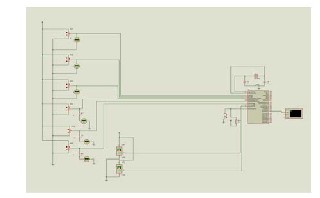
Here totally eight Analog to Digital Converter ports are utilized to receive analog inputs from potential transformer, current transformer and Temperature sensor.
STEP 6:
i. If the voltage value lies between 240 and 250 V,
then the indication is Normal voltage.
ii. If the voltage value lies between 250 and 275 V, then the indication is Critical voltage.
iii. If the voltage value exceeds 275 V, the indication is over voltage.
iv. If the voltage value is lower than 240 V, the indica- tion is low Voltage.
STEP 7:
i. If the current value is lesser than 0.3 and between
0.3 and 12 A, the indication isNormal Current.
ii. If the current value lies between 12 and 17 A, the
indication is Critical current.
Fig 9 Simulation of the Monitoring Module
The figure below displays the output of the P.T, C.T and two LM35 Sensors. The simulated results shows simulat- neously monitored value for the specified interval of time.
IJSER © 2013 http://www.ijser.org
International Journal of Scientific & Engineering Research, Volume 4, Issue 6, June-2013 1203
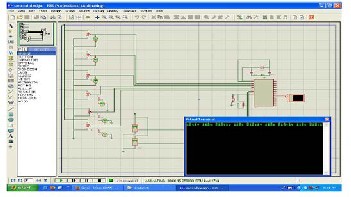
ISSN 2229-5518
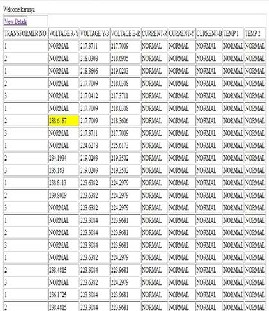
The monitored outputs of the specified parameters are displayed on the Website through GPRS Wireless tech- nology.There are altogether three webpages. The first one is the login page as shown in fig11.
Fig 10 Results for the Simulation Module
7 HARDWARE KIT AND RESULT DISCUSSION
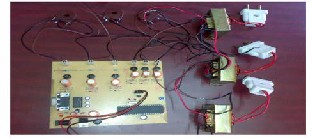
This figure below represents the hardware kit for monitoring of the distribution transformer. The same can be done for each distribution transformer in a particular zone and the input datas to the PIC Microcontroller can be transmitted to the PC using Wireless communtication tech- nology (GPRS is implemented here). The Wireless commu- nication technology can be amending to the technology developed.
Fig 11 Hardware Kit for Distribution Transformer Monitor- ing
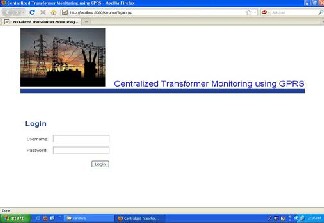
7.1 WEB PAGES
Fig 13 Monitored Values of Key parameters displayed on the Second page
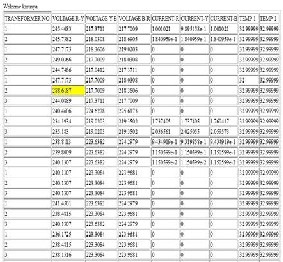
The second page displays the simultaneously mon- itored parameter value with the indication in different col- our code if it exceeds the critical value or if its about to reach the critical value.
Fig 14 Thrid Page displaying Detailed Values for each Parameter
The third page shows the detailed description of the displayed parameters.
Fig 12 Login Page of the Website Developed
IJSER © 2013 http://www.ijser.org
International Journal of Scientific & Engineering Research, Volume 4, Issue 6, June-2013 1204
ISSN 2229-5518
8 CONCLUSIONS
In this paper, the distribution transformer key pa- rameters like voltage; current and temperature are moni- tored employing PIC 16F877A Microcontroller.
The components necessary to carry out the moni- toring are chosen and are interfaced with the PIC Micro- controller.The wireless communication technology (GPRS) is put in work to transfer the monitored parameters from the PIC Microcontroller to the PC.
Ahead of actualizing the HARDWARE of this de- sign the simulation is executed in the PROTEUS environ- ment and the effectiveness of the design is checked.The future scope of the design is to realize the control module.
REFERENCES
[1] Hassan Abniki, H.Afsharirad, A.Mohseni, F. Khoshkhati, Has- san Monsef, Pourya Sahmsi ‘Effective On-line Parameters for Transformer Monitoring and Protection’, on Northern American Power Symposium (NAPS), pp 1-5, September 2010.
[2] C.Scott Thode ‘Distributed Substation Control System with PC Based Local Control’, on Advanced in Power System Control, Operation and Management vol. 2, pp 536-541, December 2003.
[3] J.A.Kischefsky,D.G.Flinn ‘Distributed Intelligence on Distribu-
tion SCADA System’, on Rural Electrical Conference, April
2004.
[4] Tong Xiaoyang, Wu Guanging, Zhang Guangehun, Tan Yong-
dong ‘A Transformer Online Monitoring and Diagnosis Em- bedded System Based on TCP/IP and Pub/Sub New Technolo- gy’, on Properties and Applications of Dielectric Materials, vol
1, pp 467-470, June 2003.
[5] J.Q. Feng, D. P. Buse, Q. H. Wu, J.Fitch ‘A Multi-Agent Based In-
telligent Monitoring System for Power Transformers in Distrib- uted Substation’, on Power System Technology, vol 3, pp 1962-
1965, December 2002.
[6] Suxiang Qian, Hongsheng Hu, ‘Design of Temperature Moni- toring System for Oil-Immersed Power Transformers based on MCU’, on International Conference on Electronic Measurements and Instrumentation (ICEMI), May 2009.
[7] Prajakta Kulkarni, Yusuf Ozturk, ‘ Mphasis : Mobile patient
health care and sensor information system’, on International
Journal on Network and Computer Applications, vol 34, pp 402-
417,January 2011.
[8] V. Thiyagarajan, T.G. Palanivel ‘An efficient monitoring of sub-
stations using Micro controller based monitoring system’, on In-
ternational Journal of Research and Reviews in Applied Scienc- es (IJRRAS), vol 4, pp 63-68, July 2010.
[9] Timo T. Vekara, Seppo Pettisssalo, N. Rajkumar, ‘Remote moni- toring system for transformer sub stations', IEEE 2007.
[10] Wu Chunming, Geng Qiang, ‘The Transformer Station Remote
Monitoring System Based on ARM/GPRS Network’, IEEE2010. [11] A.R.Ali-Ali, M. Al-Rousan, T.Ozkul ‘Implementation of experi-
mental communication protocol for health monitoring of pa- tients’, on Computer Standards and Interfaces, pp 523-530, Jan- uary 2005.
[12] Hephzibah Jose Queen, Thanu James and Neethu Lonap- pan,”Centralized Transformer Monitoring using GPRS”,May
2011.
IJSER © 2013 http://www.ijser.org













